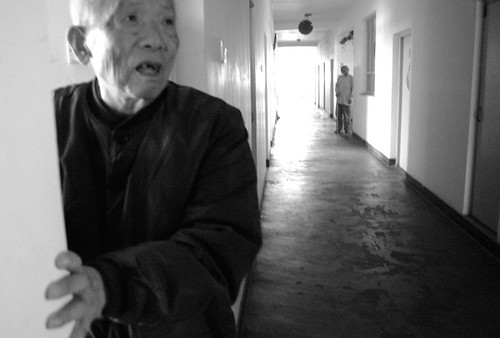The headlines proclaim China's growing financial power. But its ageing population may scupper its ambitions.
 China Rises, the blog of Beijing correspondent of McClatchy Newspapers, Tim Johnson, has a post on China's Ageing Population that points to a 30 second dynamic graphic that shows the ageing bulge moving through the population over time from 1950 to 2050. By then 31 percent of the population, or some 400 million people, will be aged over 60.
China Rises, the blog of Beijing correspondent of McClatchy Newspapers, Tim Johnson, has a post on China's Ageing Population that points to a 30 second dynamic graphic that shows the ageing bulge moving through the population over time from 1950 to 2050. By then 31 percent of the population, or some 400 million people, will be aged over 60.
China Rises says the graphic "will give you a quicker idea of the changes looming on the horizon for China" – the declining ratio of the working age population to retirees. To appreciate the change consider that in 1950 the ageing population comprised around 6 percent of the total while those of working age made up slightly less than 50 percent of the total. By the 50 year mark (2000), the aged stood at just under 10 percent of the total while the working population stood at just under 60 percent. However, by 2050 the working age population will be at just under 50 percent of the total, compared with 31 percent of the ageing population.
This change is the result of two things: improved mortality rates (folks are living longer thanks to better healthcare) and the one-child family policy.
Let’s do the maths. In 1950 there were roughly 8.3 working age people to every person over 60. But by 2050 there will 1.6 working people to every aged person. The future family structure in China will be four grandparents, two adult children, and one very hard-working grandchild. Scary stuff, indeed.
These changes are going to place a huge strain on the Chinese economic and social system. In fact, an American doctor, Joseph Flaherty, who studied the situation with the help of Chinese colleagues, wrote in the Journal of the American Geriatrics Society last year that: "Few countries in the world have faced such challenges, at the level of a potential crisis, for their elderly as China is beginning to face".
First is the issue of how China will fund the pension system necessary to take care of all these retirees – 400 million people is larger than the current combined populations of the United States and Canada. With such a small working age population, it’s not going to be easy to feed, clothe and house the elderly. The West was fortunate: Europe and the US first became rich, and then they grew old. Most people in China, however, will grow old before they grow rich.
Second, a large aged population is going to place incredible pressure on an already overburdened healthcare system. Retirement villages and nursing homes have not been a strong feature of Chinese culture because, even today, many Chinese take it as a family responsibility to care for elderly relatives. But in the future there will be increasing demands for these services to be outsourced. Additionally, more medicines for the ailments of ageing populations will be required.
While Western companies involved in the management of retirement villages and nursing homes and pharmaceutical companies may be rubbing their hands with glee, the rest of us might want to pause to consider the unthinkable.
Suppose the working age population, who have grown up without siblings, indulged by their doting parents and grandparents, opt not to take care of their ageing relatives in the future. After all, who says the West has a monopoly on granny-dumping? Cultural conditions that demanded people take care of the old and infirmare already weakening in today’s China. Thanks to 60 years of Communism, many people see it as the State’s obligation to care for the poor, the elderly and the sick, rather than their own.
Will the State be able to take up the slack? How can it, if fewer people are paying taxes?
And, as China’s median age rises, it might even face rising labour shortages in the future that would exacerbate its economic problems. The country may find it harder to attract foreign investment and its huge cache of foreign reserves will soon be whittled away as it spend its way through crisis after crisis.
In my experience, many crises occur because people, corporations or governments fail to take evasive action even when they are clearly heading straight at an iceberg. Consider the current global financial crisis. There was ample warning. Had regulators done their job properly or financial institutions followed sound principles of financial management it would not have happened.
China is clearly on a collision course with the iceberg of demographic winter. It’s time for its leaders to stop shuffling the deck chairs. The one-child family policy is one article of faith that the Chinese Government should reconsider. It would be best to do so sooner rather than later.
By: Constance Kong is the pen name of a Shanghai-based business consultant.




No comments:
Post a Comment